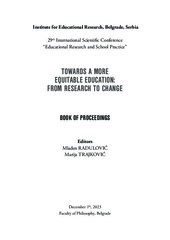Приказ основних података о документу
The Current State and Perspectives of the Functional Basic Education of Adults in Serbia
| dc.contributor | Radulović, Mladen | |
| dc.contributor | Trajković, Marija | |
| dc.creator | Miljković, Jovan | |
| dc.creator | Grozdić, Vukašin | |
| dc.creator | Ljujić, Bojan | |
| dc.date.accessioned | 2023-12-19T20:14:34Z | |
| dc.date.available | 2023-12-19T20:14:34Z | |
| dc.date.issued | 2023 | |
| dc.identifier.isbn | 978-86-7447-165-4 | |
| dc.identifier.uri | http://reff.f.bg.ac.rs/handle/123456789/5760 | |
| dc.description.abstract | Throughout its modern history, Serbia has struggled with the problem of illiteracy and the coverage of the entire population with compulsory primary education. The scale of the problem is evidenced by Table 1, which shows the state in this domain from World War II to the present day. After World War II, Serbia attempted to eradicate illiteracy with mass literacy campaigns (Bondžić, 2002), which did not produce the results envisioned by the state leadership. Later, during the existence of the FPRY and the SFRY, numerous schools for the primary education of adults were founded in which the eight-year primary education was completed in four years, according to a program that “differs from the program taught to children only in terms of duration” (Medić et al., 2009, p. 29). The 1990s saw a dramatic reduction in the number of schools for the primary education of adults, from a few dozen that operated in Serbia in the 1970s to only 16 (Medić et al., 2009, p. 18), while institutions such as workers’, public, and open universities were ”denied the right to engage in formal adult education”. It is important to emphasize that everyone over the age of 15 who has not completed primary education can be considered a member of a marginalized social group, with the most oppressed subgroups being the Roma national minority and prisoners. It is worth pointing out that the distinctive way of life of the Roma population, in addition to multiple other social-psychological factors, often serves as an explanation or the stated reason for the evidently low motivation for education, non-inclusion in the education system, early abandonment of the educational process, low educational achievements, and the underestimation of education as a possible way of social promotion and a way of getting out of poverty” (Medić & Popović, 2008, p. 117). After the democratic changes (October 5, 2000), reforms were launched in all parts of society, including adult education. In 2005, the Institute of Pedagogy and Andragogy and its partners launched the Functional Basic Education of Roma Adults, a systemic project with the status of a pilot program. The program was active until 2007 and it aimed to raise the general educational level of Roma adults and support their acquisition of basic education. It brought numerous changes to the legislation and educational practice and served as the basis for the development and implementation of a much larger systemic project entitled the Functional Basic Education of Adults (FBEA), which now constitutes the dominant concept for the implementation of adult primary education in Serbia. “It is undeniable that adult education and learning represent a social and individual instrument that enables people to live better, participate in the process of social change, and develop as human beings. In other words, this also means that adult education has an economic value, that it contributes to the participation of adults in socio-political activities, and that it encourages the development of an authentic inner self and individual needs“ (Kulić & Despotović, 2004, p. 24). This understanding clearly recognizes education as a prerequisite to equity and primary education is the first and most important step in this direction. | sr |
| dc.language.iso | en | sr |
| dc.publisher | Institute for Educational Research | sr |
| dc.relation | info:eu-repo/grantAgreement/MESTD/inst-2020/200163/RS// | sr |
| dc.rights | openAccess | sr |
| dc.rights.uri | https://creativecommons.org/licenses/by/4.0/ | |
| dc.source | Towards a more equitable education: from research to change | sr |
| dc.subject | functional basic education of adults | sr |
| dc.subject | Roma literacy | sr |
| dc.subject | prisoner literacy | sr |
| dc.title | The Current State and Perspectives of the Functional Basic Education of Adults in Serbia | sr |
| dc.type | conferenceObject | sr |
| dc.rights.license | BY | sr |
| dc.citation.epage | 194 | |
| dc.citation.rank | M33 | |
| dc.citation.spage | 188 | |
| dc.identifier.fulltext | http://reff.f.bg.ac.rs/bitstream/id/14349/bitstream_14349.pdf | |
| dc.identifier.rcub | https://hdl.handle.net/21.15107/rcub_reff_5760 | |
| dc.type.version | publishedVersion | sr |
| dc.identifier.cobiss | 130997001 |

